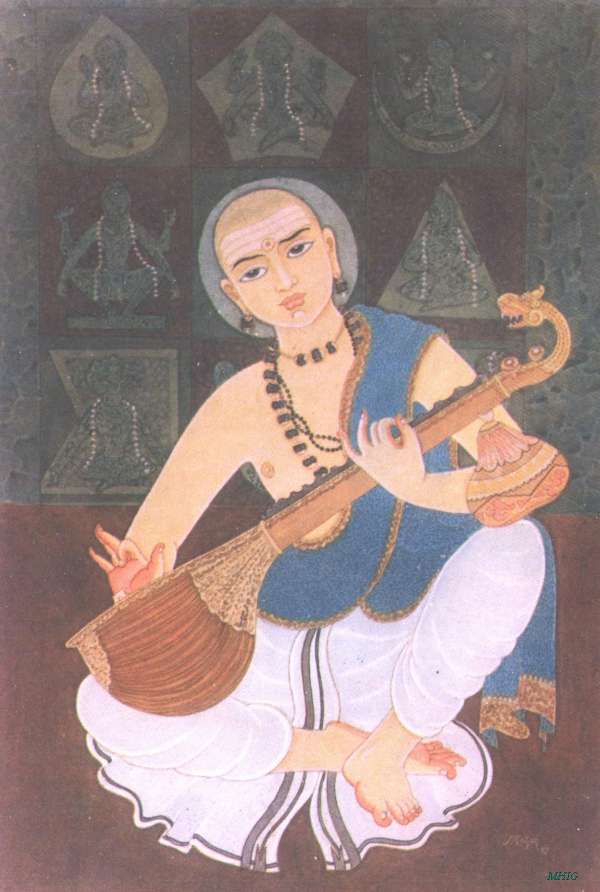Legends In Carnatic Music - Free Download Carnatic and Bhajans |
|
|
 Muttuswaamee Dikshitar - The youngest of the Carnatic Musical Trinity was born in 1776, brought up with 2 brothers and a sister with great care and acquiring proficiency in both music and Sanskrit. His family moved to Manali, where he became a disciple of Cidambaranaata Yogi and went to Varanaasi. For 5 years he stayed there and learned Hindustani music, especially the Dhrupad style of music. After his guru died, he returned to the south and came to the holy shrine of Tiruttani to pray and meditate before Lord Subramanya. One day the Lord appeared to him, asked him to open his mouth, placed a piece of sugar candy in his mouth, and disappeared. After this, Dikshitar began composing beautiful kritis. The first piece he sang was "ShreenataDi guruguhO jayati jayati." Then he went to Kaanceepuram and sang songs in praise of Ekaambaratanaata and Kaamaakshi. He visited various temples to compose songs, from the TaamrapaaNi River (Shree kaantimateem) and Rameshwaram (Raamanaatham bhajEham) to Kaasi (Kaasi visaalakshi). Then he returned to Tiruvaaroor, where he gathered disciples and taught them his composition. His brothers became proficient at rendering his compositions as well and went to Madurai to teach these songs. Once, because of poverty, Dikshitar did not have the means to make his offerings to the deity. His disciple, the famous dancer Kamalam, offered to pledge her jewels and raise the money. He refused and composed "Tyaagaraajam bhajarE," trusting in God. Soon 2 cartloads of food and articles reached his house as a gift from the manager of the choultry. After the death of his brother Cinnaswaami, his brother Baalaswaami left and was made a Samastaana Vidwaan at ETTayapuram in 1824. Dikshitar left to meet his suriving brother, and on the way fervently sang "Aanandaamruta" in amritavarshini, seeing the dry condition of the land. Apparently, there was a heavy downpour soon afterward. Dikshitar met his brother and attended his marriage as well. Then he returned to Tiuvaaroor. His group kritis include the navagraha kritis in praise of the 7 principal planets and the Kamalaambaa navaavarana kritis - 9 songs in praise of the deity of Tiruvaaroor. He also composed small kritis with SamaashTi caraNams (which include both Anupallavi and CaraNam). 461 songs in 191 raagams are available today. He used characteristic phrases of raagam and was a master of rhyme. He often chose a slow tempo. In 1835 he went to ETTaiyapuram to attend a marriage in the royal family and stayed there. "Meenaakshi mE mudam" is supposed to be one of his last compositions, created in Madurai on his way to ETTaiyapuram, where he passed away on October 21, 1835.
|